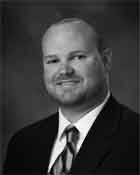 | Seth Holder has been a financial advisor with Edward Jones Investments for 6 years. Before joining Edward Jones, Seth worked in the finance department at General Electric. For more information on the services Seth provides or to schedule an appointment, please call his office at (620) 231-0071 or you can visit his office at 101 S Broadway in Pittsburg, KS. |
Banking & Finance
2011-03-01 10:08:00
Considering a business retirement plan?
Answer: If you’re self-employed or you own a business, you’ve got a lot to think about: attracting new customers, maintaining cash flow, upgrading equipment and facilities — the list goes on and on. Yet, as busy as you are today, you can’t forget about tomorrow — which means you need to have a solid retirement plan in place.
All retirement plans offer some features in common, such as tax-deferred growth of earnings. So how can you pick the plan that’s right for you? You’ll need to consider your business’ annual income, number of employees and other factors. Fortunately, you have some good plans from which to choose. Here are a few to consider:
• Owner-only 401(k) — If you are self-employed with no employees other than your spouse or a partner, the Owner-only 401(k) may be an option for you. Also known as an individual 401(k), an owner-only 401(k) offers you many of the same advantages of a traditional 401(k): a range of investment options, tax-deductible contributions and tax-deferred earnings growth. You may even be able to choose a Roth option for your owner-only 401(k), which allows you to make after-tax contributions that have the opportunity to grow tax-free. For 2010, you can contribute up to $16,500 as a deferral, and total contributions cannot exceed $49,000 or $54,500 if you’re 50 or older.
• SEP IRA — If you have just a few employees or are self-employed with no employees, you may want to consider a SEP IRA. For the 2010 tax year, you can put in the lesser of $49,000 or 25 percent of your compensation, which is capped at a maximum of $245,000. You fund the plan with tax-deductible contributions, and you must cover all eligible employees — at a minimum, those who are at least 21 and have been with your company for three out of the immediately preceding five years. (Employees themselves cannot contribute). Keep in mind, though, that the percentage of compensation contributed to a SEP IRA must be the same for you and your employees. If you don’t get a plan set up prior to year-end, the SEP IRA is the only plan that you can set up and fund, up until your tax filing deadline, to get a 2010 tax deduction.
• Solo defined benefit plan — Generally speaking, this plan, which is similar to a traditional pension plan, may be suitable for you if you have relatively high earnings and can afford to take advantage of the high contribution limits, which are determined by an actuarial calculation. Your contributions are tax deductible.
In choosing a retirement plan, you may want to consult with your tax adviser. But don’t wait any longer to get started. The future will be here soon enough — so you’ll want to be prepared for it.


